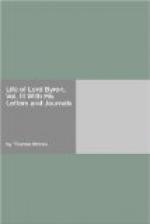“Hobhouse has told me ten thousand anecdotes of Napoleon, all good and true. My friend H. is the most entertaining of companions, and a fine fellow to boot.
“Redde a little—wrote notes and letters, and am alone, which Locke says, is bad company. ’Be not solitary, be not idle.’—Um!—the idleness is troublesome; but I can’t see so much to regret in the solitude. The more I see of men, the less I like them. If I could but say so of women too, all would be well. Why can’t I? I am now six-and-twenty; my passions have had enough to cool them; my affections more than enough to wither them,—and yet—and yet—always yet and but—’Excellent well, you are a fishmonger—get thee to a nunnery.’—’They fool me to the top of my bent.’
“Midnight.
“Began a letter, which I threw into the fire. Redde—but to little purpose. Did not visit Hobhouse, as I promised and ought. No matter, the loss is mine. Smoked cigars.
“Napoleon!—this week will decide his fate. All seems against him; but I believe and hope he will win—at least, beat back the invaders. What right have we to prescribe sovereigns to France? Oh for a Republic! ‘Brutus, thou sleepest.’ Hobhouse abounds in continental anecdotes of this extraordinary man; all in favour of his intellect and courage, but against his bonhommie. No wonder;—how should he, who knows mankind well, do other than despise and abhor them?
“The greater the equality, the more impartially evil is distributed, and becomes lighter by the division among so many—therefore, a Republic!
“More notes from Mad. de * * unanswered—and so they shall remain. I admire her abilities, but really her society is overwhelming—an avalanche that buries one in glittering nonsense—all snow and sophistry.
“Shall I go to Mackintosh’s on Tuesday? um!—I did not go to Marquis Lansdowne’s, nor to Miss Berry’s, though both are pleasant. So is Sir James’s,—but I don’t know—I believe one is not the better for parties; at least, unless some regnante is there.
“I wonder how the deuce any body could make such a world; for what purpose dandies, for instance, were ordained—and kings—and fellows of colleges—and women of ’a certain age’—and many men of any age—and myself, most of all!
“’Divesne prisco et
natus ab Inacho,
Nil interest, an pauper, et infima
De gente, sub dio moreris,
Victima nil miserantis Orci.
* * * * *
Omnes eodem cogimur.’
“Is there any thing beyond?—who knows? He that can’t tell. Who tells that there is? He who don’t know. And when shall he know? perhaps, when he don’t expect, and generally when he don’t wish it. In this last respect, however, all are not alike: it depends a good deal upon education,—something upon nerves and habits—but most upon digestion.
“Saturday, Feb. 19.
“Just returned from seeing Kean in Richard. By Jove, he is a soul! Life—nature—truth without exaggeration or diminution. Kemble’s Hamlet is perfect;—but Hamlet is not Nature. Richard is a man; and Kean is Richard. Now to my own concerns.




